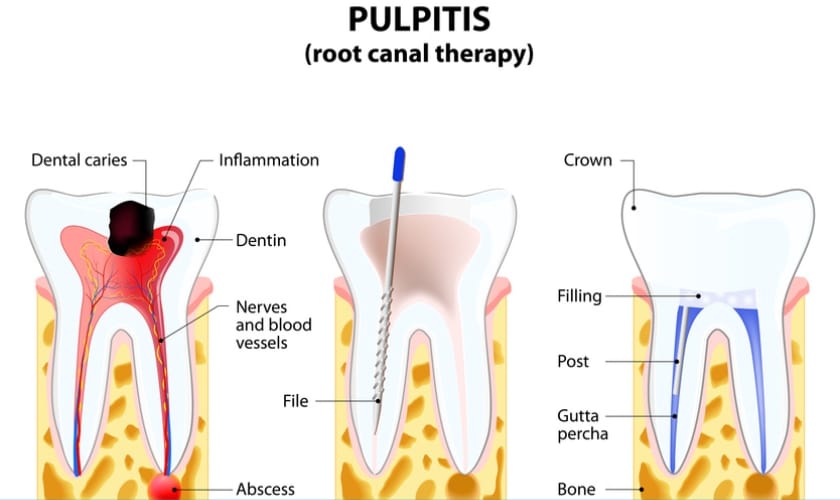
Your wisdom teeth are molars that usually grow between the age of seventeen to twenty-five years. They are the last to grow and are hence known as the “wisdom teeth.” Like any other teeth, wisdom teeth are susceptible to decay, dental cavities, impact, etc. In this blog, we are going to discuss what should be done if you suffer from the problem of wisdom tooth decay.
How Does The Infection Occur?
The wisdom teeth can get infected as they are really difficult to clean. The food particles and bacteria get stuck between teeth and gums. In fact, the space between your wisdom teeth and the back portion of your mouth can be easy to miss while flossing or brushing.
It’s possible that an impacted wisdom tooth won’t grow correctly through your gums. It can partially emerge, grow in at an angle, or grow completely sideways.
A tooth cavity or infection can happen due to the overgrowth of bacteria which ultimately make holes in the outer hard enamel layer of the teeth. A wisdom tooth that is just partially impacted is more likely to get infected. This is because its angle and shape increase the chance of decay.
The different kinds of bacteria causing infection in and around the wisdom teeth have been mentioned in the pointers below:
- Prevotella
- Streptococcus
- Peptostreptococcus
- Actinomyces
- Eikenella corrodens
- Fusobacterium
- Aggregatibacter
What Are The Treatments For Infected Wisdom Teeth?
The treatment plans available for wisdom teeth infection can involve:
- Medicine to treat the teeth
- Dental procedure to repair the teeth
- The surgery for tooth extraction
Your dentist will first examine the teeth and also take an X-ray of the area. This will enable him/her to determine which treatment best suits your needs.
1. Medications
Antibiotics help heal an infected tooth and prevent the spread of bacteria. They will be required to treat an infection in a wisdom tooth. You must take antibiotics for at least a week before the affected tooth is removed or repaired.
Your dentist or physician might suggest antibiotics like:
- amoxicillin
- penicillin
- erythromycin
- metronidazole
- clindamycin
Some of the other pain medications that your dentist can prescribe are:
- lornoxicam
- ibuprofen
- aspirin
- acetaminophen
2. Repair
Once the infection is dealt with, you’ll need to visit your dentist once again to repair or remove the tooth. Fixing a cavity in a wisdom tooth is similar to patching up the other teeth. You may also need a crown or filling.
Additionally, your dentist can also file down the tooth’s top or sides. This help to get rid of any lumpy or jagged edges that can trap food and bacteria. It also helps to make the tooth slightly smaller if there is a problem of crowding.
3. Removal
Your dentist might remove your wisdom teeth whole or in part if it is damaged. You might need to undergo dental surgery if you have an impacted wisdom tooth infection. Other impacted wisdom teeth can also be extracted to prevent any further infections.
Your dentist might remove gum tissue from the top of an impacted wisdom tooth, helping it grow. Coronectomy is another dental procedure that removes only the wisdom tooth’s top portion. This helps in protecting the tooth nerves, roots, and jawbone around the tooth.
4. Surgery
Extraction of wisdom teeth can be complicated. You will either need local anesthesia or general anesthesia for the treatment process to be performed seamlessly. The treatment can take twenty minutes or even more. Your dentist may need to section the tooth and then remove it in pieces accordingly. This lessens the risk of jawbone and nerve damage.
The possible risks and side effects of wisdom teeth removal are
- Infection
- Bleeding
- Weakness in the jawbone
- Numbness in your lower lip, chin, and tongue
An infection can develop in your mouth after two weeks or even two months of the wisdom teeth extraction. In such a situation, you should get in touch with a dentist as soon as possible. Some other dosages of antibiotics can be required to treat the situation.
Which Home Remedies Can Be Helpful?
Adopting home remedies is not sufficient to treat infected wisdom teeth. However, following a few guidelines can help you get relief from discomfort and pain.
- Salt water rinse – Add salt to warm or cold drinking water. Salt helps to slow down the growth of bacteria temporarily. Spit out the water after swishing it around your mouth a couple of times.
- Hydrogen peroxide – Mix drinking water with hydrogen peroxide in an equal ratio. Hydrogen peroxide will help in the removal of some surface germs surrounding the infection due to its antibacterial properties. Use this as a mouthwash.
- Cold compress – Apply an ice pack or a cold cloth to the infected area outside your cheek. Using a cold compress helps to soothe inflammation and swelling.
- Clove oil – Cloves consist of natural antibacterial oils. Apply clove oil straight on your wisdom tooth with the help of a cotton swab. Repeat a few times to reduce pain and swelling.
- Over-the-counter medication – Pain medication and numbing gels can help you manage the discomfort and also get a good night’s sleep before the dental appointment. Minor dental discomfort can be relieved by painkillers and benzocaine-numbing gels.
We hope you have now understood what to do in case of an infected wisdom tooth. Get in touch with Arcade Dental if you have any further questions related to this query.




